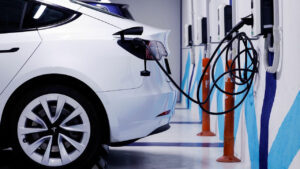
EVs to make up less than 10% of total vehicle sales this year — CAMPI
THE Chamber of Automotive Manufacturers of the Philippines, Inc. (CAMPI) expects that electric vehicles (EVs) will not reach 10% of total vehicle sales in the Philippines this year despite increasing demand, its president said.
EVs have so far captured 4% of the total industry’s sales, CAMPI President Rommel R. Gutierrez said on the sidelines of a press conference last week.
“I think [this will increase], but I don’t think it can reach 10% because sales of internal combustion engine vehicles are really going up,” Mr. Gutierrez told reporters on Aug. 19 in a mix of English and Filipino.
“So I think percentage-wise, not so much, but volume-wise, [the sale of EVs] is really picking up,” he added.
For the first seven months of the year, automotive sales increased by 10.9% to 265,610 units from 239,501 units a year ago.
Meanwhile, CAMPI revised its 2024 target to a record 500,000 units, reflecting a 16.3% increase from the 429,807 units sold in 2023.
Mr. Gutierrez said that the increase in both sales and the launch of EVs can be partly attributed to the expansion of Executive Order (EO) No. 12 to include hybrid electric vehicles (HEVs) and plug-in hybrid electric vehicles (PHEVs) in the tariff exemption.
“Initially, it covered only pure EVs, but now it includes HEVs, whose sales are actually much higher compared to pure EVs,” he said.
“But we are, of course, cautious because there is a yearly review of the performance, so we really need to match the expectations. So, everybody is pushing, even other brands, led by Toyota, are really bringing in EVs because they see the potential,” he added.
On June 20, President Ferdinand R. Marcos, Jr. signed EO 62, which modified the rates of import duty on various products.
The EO covered the expansion of the reduced Most Favored Nation tariff rates of the products covered under EO No. 12 to other battery EVs, HEVs, PHEVs, and certain parts and components.
The National Economic and Development Board approved in May the expansion of the coverage of EO 12, which temporarily reduces tariffs on EVs to zero until 2028.
Aside from the 34 lines of EVs covered by EO 12, it will now also cover e-motorcycles, e-bicycles, nickel metal hydride accumulator batteries, e-tricycles and quadricycles, HEVs, and PHEV jeepneys or buses. — Justine Irish D. Tabile
